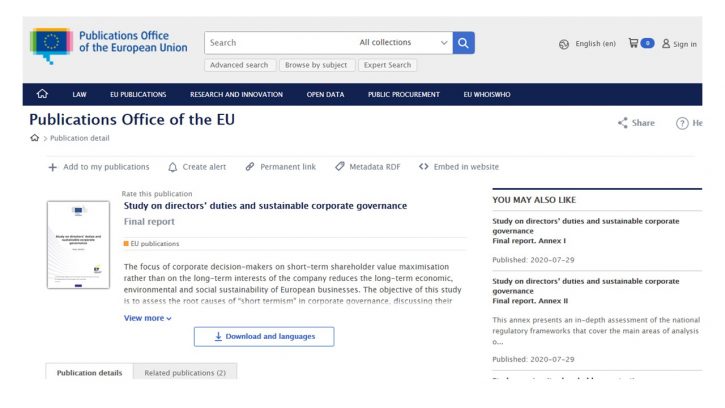
Étude de l’UE sur les devoirs des administrateurs : une gouvernance loin d’être durable !
Belle étude qu’offre l’Union européenne sur les devoirs des administrateurs et la perspective de long-terme : « Study on directors’ duties and sustainable corporate governance » (29 juillet 2020). Ce rapport document le court-termisme de la gestion des entreprises en Europe. En lisant les grandes lignes de ce rapport, on se rend compte d’une chose : on est loin du compte et la RSE n’est pas encore suffisamment concrétisée…
Résumé :
L’accent mis par les instances décisionnelles au sein des entreprises sur la maximisation à court terme du profit réalisé par les parties prenantes, au détriment de l’intérêt à long terme de l’entreprise, porte atteinte, à long terme, à la durabilité des entreprises européennes, tant sous l’angle économique, qu’environnemental et social.
L’objectif de cette étude est d’évaluer les causes du « court-termisme » dans la gouvernance d’entreprise, qu’elles aient trait aux actuelles pratiques de marché et/ou à des dispositions réglementaires, et d’identifier d’éventuelles solutions au niveau de l’UE, notamment en vue de contribuer à la réalisation des Objectifs de Développement Durable fixés par l’Organisation des Nations Unies et des objectifs de l’accord de Paris en matière de changement climatique.
L’étude porte principalement sur les problématiques participant au « court-termisme » en matière de droit des sociétés et de gouvernance d’entreprises, lesquelles problématiques ayant été catégorisées autour de sept facteurs, recouvrant des aspects tels que les devoirs des administrateurs et leur application, la rémunération et la composition du Conseil d’administration, la durabilité dans la stratégie d’entreprise et l’implication des parties prenantes.
L’étude suggère qu’une éventuelle action future de l’UE dans le domaine du droit des sociétés et de gouvernance d’entreprise devrait poursuivre l’objectif général de favoriser une gouvernance d’entreprise plus durable et de contribuer à une plus grande responsabilisation des entreprises en matière de création de valeur durable. C’est pourquoi, pour chaque facteur, des options alternatives, caractérisées par un niveau croissant d’intervention réglementaire, ont été évaluées par rapport au scénario de base (pas de changement de politique).
Pour un commentaire, voir ce billet du Board Agenda : « EU urges firms to focus on long-term strategy over short-term goals » (3 août 2020).
À la prochaine…